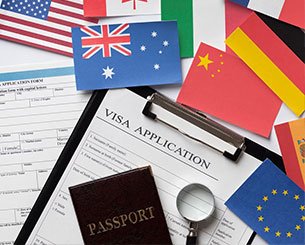About Us
At KINGDOM MIGRATIONS, we specialize in simplifying the Canada, Australia, New Zealand, Europe & USA immigration process for individuals and families. With years of expert knowledge and personalized support, we provide tailored guidance through every step, from visa applications to achieving permanent residency (PR). Our mission is to make your immigration journey as smooth and stress-free as possible, offering reliable advice at each milestone. Whether you’re looking to study, work, or settle in Canada, our experienced team is committed to making your dream a reality. We take pride in delivering clear, honest advice, helping you navigate the complex world of immigration with confidence.
Work Visa – H1B - Kingdom Migrate
- Home
- Work Visa – H1B - Kingdom Migrate
Why apply for US H1B Visa?
The US H1B Visa is one of the most popular ways to work in the US. It is a visa that an employer must apply for on behalf of a specialist employee. Since the visa is granted to specialists, typically applicants hold at least a Bachelor’s degree and are from fields such as IT, finance, architecture, medicine, science, etc. Kingdom Migrate helps employers with filing for H1B petitions for their employees. We also help employees from across the world get hired by companies likely to sponsor them for an H1B visa.
How does the H1B Visa Work?
The H1B visa is a non-immigrant visa that allows U.S. companies to employ graduate-level workers in specialty occupations that require theoretical or technical expertise in specialized fields such as in IT, finance, engineering, mathematics, science, medicine, etc. Here’s an overview of how the H1B visa process generally works:
Throughout the process, there are numerous legal and regulatory steps to be followed, and the timing and specific requirements can vary based on individual circumstances and current immigration laws. The complexity of the process often necessitates legal advice or the assistance of an immigration professional.
US H1B Visa Details:
The H1B Visa is one of the most competitive visas to apply for. Due to there being an annual visa cap, there is a huge demand from US employers applying for this visa. Additionally, since it is a route to a Green Card, it is one of the best visas to apply to work in the US.
Under the H1B, successful petitioners can:
Validity of the H1B Visa
Documents Required for US H1B Visa:
The H1B is a point-based visa system and you need a minimum of 12 points for your application to be assessed. You must have:
- A Bachelor's or Master's degree from the US (or an equivalent in your country)
- Or 12 years work experience
- Or a mix of education and work experience
You are awarded points as follows:
- 3 points for every 1 year of college studies
- 1 point for every 1 year of work experience
Once you score a minimum of 12 points, your H1B petition can then be prepared.
What are the current problems of those applying for an H1B visa and those sponsoring them?
Applying for an H1B visa and sponsoring an H1B candidate can come with a variety of challenges both for the applicants and the sponsoring employers:
For H1B Visa Applicants:
For H1B Visa Sponsors (Employers):
Regulatory Compliance: Employers must comply with various regulations, including labor condition applications that attest to the wages, working conditions, and that the employment of H1B workers will not adversely affect U.S. workers.
Public Scrutiny and Audits: There is increasing scrutiny of companies that employ H1B workers. Employers may face audits by the DOL to ensure compliance with the terms of the labor condition application.
Workforce Planning Challenges: The uncertainty inherent in the lottery system makes it difficult for employers to plan their workforce needs, as they cannot be sure that a selected candidate will actually receive a visa.
Retention Concerns: If an H1B employee chooses to leave the company or if their visa is not extended, the employer must find a replacement, which can be a time-consuming and costly process.
Risk of Visa Denials: An increase in visa denials or Requests for Evidence (RFEs) has been reported in recent years, creating additional hurdles for employers trying to hire foreign talent.
Both applicants and sponsors must navigate a complex web of legal and procedural requirements throughout the H1B visa process. The dynamic nature of immigration policies, the competitive landscape, and the administrative burdens can present significant challenges for all involved parties.
When is the best time to apply for an H1B Visa?
The best time to apply for an H1B visa is generally early in the year before the U.S. government's fiscal year begins on October 1. The United States Citizenship and Immigration Services (USCIS) typically starts accepting H1B petitions on April 1 for the visas that will be issued in the fiscal year starting October 1. Here's a timeline and some considerations for H1B visa application:
January to March: This is the period when applicants and their prospective employers should start preparing their H1B visa petitions. It involves gathering all the necessary documentation, including labor condition approval (LCA) from the Department of Labor, which must be filed before the H1B petition.
April 1: USCIS begins accepting H1B petitions. Since there's a cap on the number of H1B visas issued each year, and the demand often exceeds the cap within the first few days of April, it's crucial to have the petition ready to submit by this date.
After April 1: Once the cap is reached, USCIS will not accept any new H1B petitions for that fiscal year. If the petition is selected in the H1B lottery and approved, the beneficiary can start working on October 1, the start of the fiscal year for which the visa is issued.
It's important to note that the preparation for filing an H1B petition should begin well in advance of these dates. Employers and applicants need to account for the time it takes to:
- Establish eligibility for the H1B program.
- Complete the LCA, which itself can take a week or more to be certified.
- Prepare a detailed job description that fits within the specialty occupation requirements.
- Compile educational and professional documents, including evaluations for foreign degrees.
- If necessary, prepare responses to Requests for Evidence (RFE), which are commonly issued by USCIS if they need more information to determine eligibility.
Due to the competitive nature of the H1B visa process and the cap on the number of visas issued, it's advisable to work with a knowledgeable immigration attorney or a consulting firm specializing in H1B visas to ensure timely and correct filing.
How to get H1B Visa from India?
Here are the steps to apply for H1B visa:
Step 1: Determine your visa type by reading Common Nonimmigrant Visas. Each visa type explains the qualifications and application items. Choose the visa type that applies to your situation.
Step 2: The next step is to complete the Nonimmigrant Visa Electronic Application (DS-160) form. Be sure to read the Guidelines for Completing the DS-160 Form carefully. All information must be correct and accurate. Once the form is submitted, you cannot make any changes.
Step 3: Once you have completed the DS-160, you must pay the visa fee.
Step 4: You will need to log in to your profile with the same credentials you used to pay your visa fee. On the website, you must schedule two appointments, one for the Visa Application Center (VAC) and one for the visa interview at the Embassy or Consulate.
Step 5: Ensure you take the required documents with you for the Visa Application Centre (VAC) appointment.
Step 6: After your visit to the Visa Application Centre to have your photo and fingerprints taken, you will then visit the U.S. Embassy or Consulate on the date and time of your visa interview along with the required documents.
What is the cost of the H1B visa to the applicant and to the sponsor?
The cost of an H1B visa can vary depending on a variety of factors, including attorney fees, the size of the sponsoring company, and whether the employer chooses to expedite the processing of the petition using Premium Processing. The basic costs set by the United States Citizenship and Immigration Services (USCIS) are as follows:
For the Sponsoring Employer:
- Base Filing Fee: The standard H1B filing fee is $460 for the I-129 petition.
- American Competitiveness and Workforce Improvement Act (ACWIA) Fee: Employers with 1 to 25 full-time equivalent employees pay $750, while employers with 26 or more full-time equivalent employees pay $1,500.
- Fraud Prevention and Detection Fee: A $500 fee is required for new H1B applications and for those changing employers.
- Public Law 114-113 Fee: Employers with more than 50 employees, with more than 50% of those employees on H1B or L-1 visas, must pay an additional $4,000 for H1B petitions.
- Optional Premium Processing Fee: Employers who wish to expedite the processing of their H1B petitions can pay an additional $2,500 for the USCIS Premium Processing Service, which guarantees a response within 15 calendar days.
- Immigrant Attorney Fees: Attorney fees can vary widely but are typically around $1,000 to $3,000 for H1B visa services. Some companies may have in-house immigration counsel and might not incur this cost.
- H1B Visa Issuance Fee: Based on reciprocity, the fee can vary by nationality for the visa to be issued at the U.S. Consulate or Embassy. This is typically paid by the applicant.
For the Applicant:
- Visa Application Fee: Applicants may be required to pay a visa application fee, which is $190 for the H1B visa.
- Visa Issuance Fee: This fee varies by country and is based on reciprocity. It should be checked with the local U.S. Embassy or Consulate.
- Medical Examination and Vaccination Fees: If required, these fees will vary by provider.
- Travel and Accommodation Fees: For attending the visa interview at a U.S. Embassy or Consulate and for moving to the U.S. if the visa is granted.
- SEVIS Fee: This is not required for H1B visas but is relevant for those applying for an F or J visa for study or exchange programs.
It's important to note that the costs can change, and the USCIS may update fees; applicants and sponsors should check the latest fees on the USCIS official website or consult with an immigration attorney for the most current information. Moreover, according to U.S. law, the employer is required to pay the H1B visa petition fees, not the employee. This is to ensure that the hiring of foreign workers does not come at a lower cost than hiring U.S. workers.
How long does it take to process the H1B Visa once it is applied for?
The processing time for an H1B visa can vary based on several factors, including the workload at the USCIS service center where the petition is filed, the accuracy and completeness of the petition, and whether the employer has opted for premium processing. Here is a general breakdown:
Regular Processing:
The standard processing time can range from 2 to 6 months. However, this can fluctuate widely depending on the volume of applications received by USCIS and other factors affecting their workload.
Premium Processing:
Employers can choose premium processing by paying an additional fee of $2,500. This service guarantees that USCIS will process the petition within 15 calendar days. If USCIS fails to meet this deadline, they will refund the premium processing fee but will continue to process the petition expeditiously.
Factors Affecting Processing Time:
- Service Center Workload: Different USCIS service centers may have different processing times based on their caseload.
- Request for Evidence (RFE): If USCIS issues an RFE, the processing time will be longer. The clock stops on the initial processing time until the additional documentation is received.
- Accuracy of the Application: Incomplete or inaccurate applications can result in delays or denials, affecting processing time.
- Visa Cap: If the application is subject to the annual cap, it can only be filed during the H1B filing period starting on April 1st, and the processing will begin after the petitions are selected in the lottery.
After Visa Approval:
Once the H1B visa petition is approved, the applicant needs to apply for the visa at a U.S. Embassy or Consulate in their home country. The time frame for an appointment can vary, and visa processing at the consulate typically takes a few days to a few weeks.
Applicants and employers should monitor the USCIS website for the most current processing times, as these can change. Additionally, it is recommended to consult with an immigration attorney or a professional for the most up-to-date and detailed information regarding individual circumstances.


Address: Sheikh Rashid Tower World Trade Centre Dubai UAE
Phone: 00971 4 4462045
Phone: +1 914 6390676
Email: info@kingdommigrate.com






